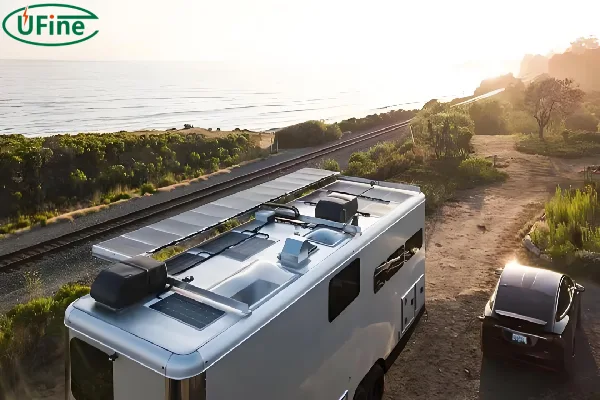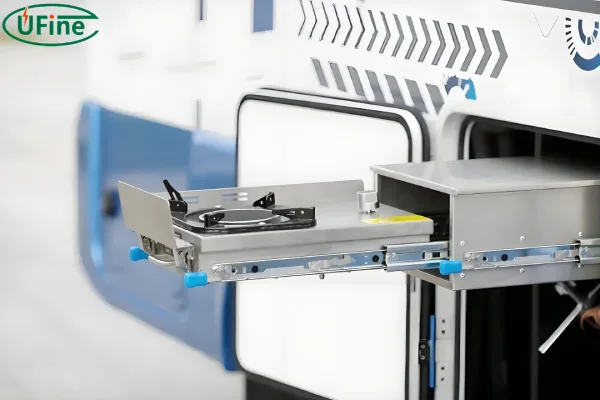When it comes to powering your RV, the right battery can make all the difference. With so many options on the market, it can be overwhelming to decide which one to choose. In this article, we will delve into why lithium batteries, specifically Lithium Iron Phosphate (LiFePO4), are the best choice for your RV. We’ll cover everything you need to know before buying RV batteries, compare LiFePO4 with AGM batteries, discuss pricing and lifespan, and answer some frequently asked questions. 
Part 1. What should you know before buying RV batteries?
Before purchasing RV batteries, it’s essential to understand the conditions they need to meet and what you should pay attention to:
- Capacity: Ensure the battery has enough amp hours (Ah) to meet your energy needs.
- Durability: The battery should withstand the vibrations and movements of the RV.
- Weight: Consider the weight, as heavier batteries can affect your RV’s overall weight and fuel efficiency.
- Maintenance: Determine if you prefer a low-maintenance battery or if you are okay with regular upkeep.
- Lifespan: Check how long the battery is expected to last, both in terms of charge cycles and overall years.
- Safety: Look for batteries with built-in safety features to prevent overcharging, overheating, and short-circuiting.
Part 2. Why should you choose lithium batteries (LiFePO4) for RV?
LiFePO4 batteries offer numerous advantages for RV use:
- Long Lifespan: They last significantly longer than traditional lead-acid batteries, often up to 10 years or more.
- Lightweight: LiFePO4 batteries are much lighter, reducing the overall weight of your RV and improving fuel efficiency.
- High Efficiency: They have a higher energy density, meaning more power in a smaller package. They also charge faster and more efficiently.
- Low Maintenance: Unlike lead-acid batteries, LiFePO4 batteries require virtually no maintenance.
- Safety: These batteries are designed to be safer, with built-in protections against overcharging, overheating, and short-circuiting.
- Eco-Friendly: They are more environmentally friendly, as they contain no toxic materials and are recyclable.
Part 3. AGM VS LiFePO4 battery
When comparing AGM (Absorbent Glass Mat) and LiFePO4 batteries, several factors come into play:
- Lifespan: AGM batteries typically last between 3 to 5 years. In contrast, LiFePO4 batteries can last up to 10 years or more, offering greater value over time.
- Capacity: AGM batteries have a lower energy density, which means they require more space for the same capacity. LiFePO4 batteries, with their higher energy density, provide more power in a smaller footprint.
- Size and Weight: AGM batteries are heavier and bulkier compared to the lighter and more compact LiFePO4 batteries. This difference can affect your RV’s handling and fuel efficiency.
- Price: AGM batteries are generally cheaper upfront. However, considering their shorter lifespan, they may end up costing more over time. LiFePO4 batteries have a higher initial cost but are more cost-effective in the long run due to their durability and efficiency.
- Maintenance: AGM batteries require some maintenance, such as checking electrolyte levels and periodic equalization. On the other hand, LiFePO4 batteries are virtually maintenance-free, saving you time and effort.
- Safety: Both AGM and LiFePO4 batteries are safe, but LiFePO4 batteries have built-in protections against overcharging, overheating, and short-circuiting, making them a safer choice for RVs.
- Environmental Impact: AGM batteries contain toxic materials and are not as easily recyclable as LiFePO4 batteries, which are more environmentally friendly.
Part 4. How much should I pay for lithium batteries for RV?
The cost of lithium batteries for RVs can vary widely based on capacity, brand, and additional features. Generally, you can expect to pay between $500 to $2,000 or more for a high-quality LiFePO4 battery. Factors influencing the price include the battery’s capacity (measured in amp hours), the quality of the materials used, the presence of built-in safety features, and the reputation of the manufacturer.
Higher capacity batteries with advanced features like Bluetooth monitoring and enhanced safety protections tend to cost more. However, the initial investment is often offset by the long lifespan and low maintenance requirements of LiFePO4 batteries, making them a cost-effective choice over time.
Part 5. How long do lithium batteries (LiFePO4) last lofgfor RV?
Lithium batteries (LiFePO4) for RVs can last up to 10 years or more, depending on usage, maintenance, and environmental factors. Several factors affect the lifespan of a lithium battery:
- Usage Patterns: Frequent deep discharges can shorten battery life. It’s best to avoid draining the battery completely and instead recharge it before it drops too low.
- Charging Practices: Using the correct charger and avoiding overcharging can extend battery life. LiFePO4 batteries should be charged with a charger specifically designed for lithium batteries.
- Temperature: Extreme temperatures can impact battery performance and longevity. Keeping the battery within its recommended temperature range helps maintain its health.
- Storage: Proper storage when the battery is not in use, such as keeping it partially charged and in a cool, dry place, can prevent premature aging.
Choosing the right battery for your RV is crucial for ensuring reliable power and longevity. LiFePO4 batteries offer numerous advantages over traditional batteries, including a longer lifespan, higher efficiency, and better safety features. By understanding the benefits and proper maintenance of LiFePO4 batteries, you can make an informed decision that enhances your RV experience.
Part 6. FAQs
-
Can I use my existing charger for a LiFePO4 battery?
It’s best to use a charger designed for LiFePO4 batteries to ensure optimal performance and safety. -
Are LiFePO4 batteries safe?
Yes, LiFePO4 batteries are safe. They have built-in protections against overcharging, overheating, and short-circuiting. -
How do I dispose of a LiFePO4 battery?
LiFePO4 batteries are recyclable. Take them to a certified recycling center or return them to the manufacturer. -
Can I mix LiFePO4 batteries with other types?
It’s not recommended to mix different types of batteries as it can lead to imbalances and reduced performance. -
How do I store my LiFePO4 battery when not in use?
Store it in a cool, dry place and keep it partially charged (around 50-70%).
Related Tags:
More Articles

What Are the Different Series of LiFePO4 Batteries?
Understanding what different series of lifepo4 batteries can boost your projects. Check out our guide and pick the right cell for you! Learn more now.
Gravity Battery vs. Traditional Battery: A Comparative Analysis
Gravity batteries use gravitational energy for storage. This article compares them to traditional batteries, exploring mechanisms, advantages, and applications.
What Is a Gravity Battery?
A gravity battery stores electricity using gravitational energy. This article explores its mechanics, benefits, and real-world applications in renewable energy.
How to Choose the Right Battery Relay for Your Vehicle?
Choosing the right battery relay ensures optimal performance. This article explores key factors and answers common questions for selecting a reliable relay.
What to Know Before Buying a Riding Mower Battery
Ready to buy a riding mower battery? Learn the key factors to consider. Discover what you need to choose the best battery today!






